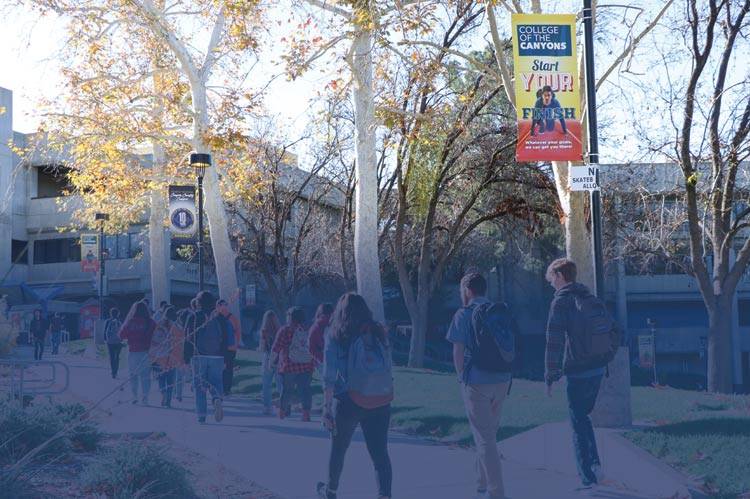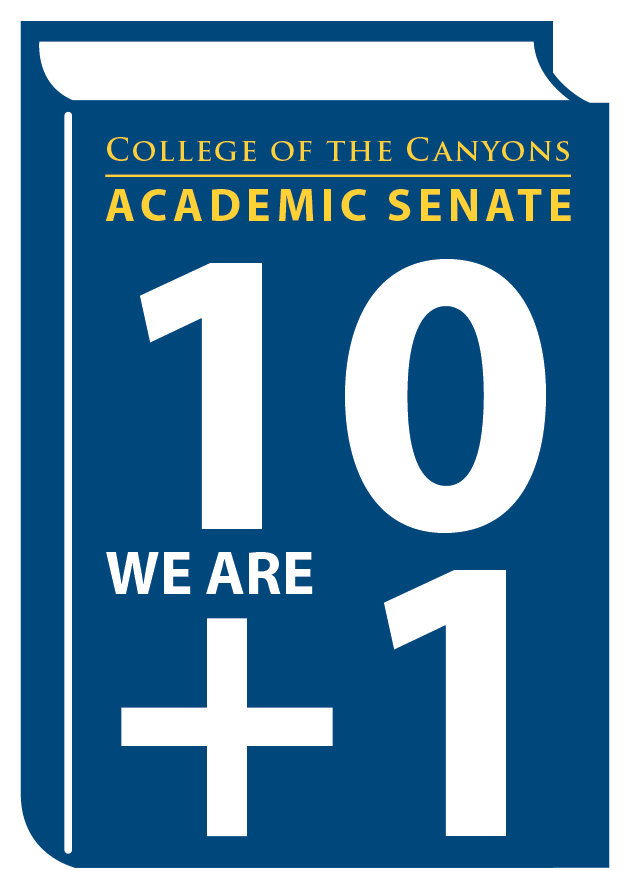Academic Senate Newsletter February 2019
COLLEGE OF THE CANYONS
ACADEMIC SENATE NEWSLETTER
WHAT IS THE ACADEMIC SENATE?
The Academic Senate serves as the official voice of the faculty. In addition, the Academic Senate serves an important role in implementing the 10+1 responsibilities which are:
- Curriculum, prerequisite and planning of course disciplines
- Certificate and degree requirements
- Grading policies, standards and policies regarding student preparation and success
- Appointing faculty members to District and College committees
- Establishes policies, procedures and programs for faculty profession-al development activities
- Develops processes for program review
- Develops new education programs
- District governance
- Delineates faculty roles and involvement in accreditation processes
- Financial Policies of faculty professional development activities
- The determination of processes to be utilized in institutional planning and budgeting and;
- Other academic professional matters
In addition to the eleven specific areas defined by Title 5 described above, the Education Code assigns additional responsibilities to Academic Senates such as: Minimum qualifications and equivalencies processes,Faculty hiring, Faculty evaluation and tenure review, Administrative Retreat Rights and Faculty Service Areas.
ACADEMIC SENATE MEETINGS,
BONH-330; 3:00-5:00 PM
- February 28
- April 11
- May 23
- March14
- April 25
- March28
- May 09
INSIDE THIS ISSUE
Involvement in Statewide Policy Development
Guided Pathways
Canyons Completes
Academic Freedom
Champions...Higher Ed.
CTE Liaison: Strong Workforce
Curriculum
New Senators
Special Resolution
Retirees
Announcements
Changes
Did you know?
The Academic Senate must follow the Open Meeting/Brown Act. Thus, the Academic Senate publishes and posts its agendas 72-hours prior to Academic Senate meetings in order to comply with the law. The structure of the Academic Senate has changed to establish an Executive Committee of the Senate composed of the Chairs of the Academic Senate Committees. This Committee has started to meet regularly since Fall of 2015. The Academic Senate President and Vice President attend every ASCCC Fall and Spring Plenary sessions to participate in ASCCC resolution process, learn about policy changes that are happening that affect faculty participation in governance and more! To improve Academic Sen-ate communication with the faculty, the Academic Senate web site was recently revised and expanded; it is reviewed regularly to maintain its currency.
WHO DO WE REPRESENT?
You! The Academic Senate represents all faculty, which includes 224 full-time faculty and approximately600 part-time instructors in shared governance structures. As representative body, it meets twice monthly each semester. Full-time faculty elect a President and Vice-President for 2-year terms. Full-time faculty in each school elect one representative. The full-time faculty as a whole elects additional at-large senators based on a formula of 1 Senator per every 40 full-time faculty members. The Senate also reserves three seats for adjunct faculty Sena-tors elected at-large by the adjunct faculty. There are non-voting positions for COCFA and AFT.
INVOLVEMENT IN STATEWIDE POLICY DEVELOPMENT
The Academic Senate for California Community Colleges (ASCCC) meets twice a year in Plenary Session to adopt resolutions which become the basis for future policies and which drive the work of the statewide Academic Senate.The cur-rent appointed delegate for ASCCC Plenary is Academic Senate Vice President Jason Burgdorfer.
The resolutions process is based in the democratic traditions of broad and inclusive debate and informed decision-making. It is reflective of ASCCC's desire to have its work guided by the collective wisdom of its members, local senates, and the delegates that represent those senates at ASCCC.
Although there was not a resolution calling for a Vote of No Confidence in the California Community College Chancellor, Eloy Oakley,at the ASCCC Fall 2018Plenary Session, the delegates did pass a resolution requesting improved collegial consultation between the Chancellor's Office and faculty. In the meantime, many local academic senates around the state have been passing resolutions expressing Vote of No Confidence.
Similarly, a Resolution for a Vote of No Confidence in Eloy Oakley was recently reviewed and approved by the Academic Senate Executive Committee. Subsequently, the Academic Senate had a first reading on this resolution and is planning on taking Action this semester. If you would like to know more about why the Senate is considering taking this serious type of action, please contact your Senator!
GUIDED PATHWAYS
By Rebecca Eikey, Academic Senate President
College of the Canyons is involved in two Guided Pathways programs, one is the California Guided Pathways Program (CA20), a competitive program that required the colleges to apply for acceptance and required the support of the Academic Senate. The second is the Guided Pathways Award Program which is defined in legislation to include criteria and funds for colleges to implement Guided Pathways frameworks. Guided Pathways framework is intended to help students succeed by providing clear course-taking patterns that promote better enrollment decisions and integrates support services in ways that make it easier for students to access the help they need. Guided Pathways is a college-wide undertaking and integrates California-based initiatives such as SSSP, Equity, Basic Skills Transformation, the Strong Workforce Program, and California College Promise. There are one-time funds associated with the Chancellor's Office GP Award.There are two faculty Guided Pathways Liaisons, Erika Torgeson representing Student Services and Tara Williams, representing Academic Affairs.
CANYONS COMPLETES: A GUIDED PATHWAYS MOVEMENT
By Dr. Tara Williams and Erika Torgeson, Guided Pathways Liaisons
Canyons Completes (Guided Pathways) has begun to take shape on how our college can increase completion rates (whether this was a class, a semester, and/or a certificate/degree), increase retention, increase support services for underrepresented populations, increase career exploration and experiential learning, overhaul our matriculation process, develop Equity-minded practitioners, streamline counseling services, increase Non-Credit offerings, update messaging to students, and decrease time to graduation. The aforementioned notions be-came our guiding priorities to make up our Four Pillars of Guided Pathways. College of the Canyons has brought Rob Johnstone in as a speaker on two occasions, attended Institutional Effective Partnership Initiative (IEPI) workshops, paid to join the CA20 Guided Pathway schools, attended the Guided Pathways Institute IV, and reached out to other colleges that have implemented Guided Pathways. Like many other colleges, we do not have the answers for the picture of Guided Pathways a tour college. We are currently exploring the roles of meta-majors, program mapping, data coaches, faculty mentors/leads, adult learners, student success teams, Early Alert (Starfish), and messaging to students in our Guided Pathways framework.
Did you know?
The Academic Senate President attends Board of Trustees meetings year-round and regularly provides a report on the work of the Senate to the Board. The Academic Senate provides funding for faculty to attend ASCCC sponsored conferences such as the Faculty Leadership Institute, Curriculum Institute, ASCCC regional meetings and more. The Academic Senate has a Program Review linked to the college's strategic goals and budget development.

 My Canyons
My Canyons  Canvas
Canvas 


